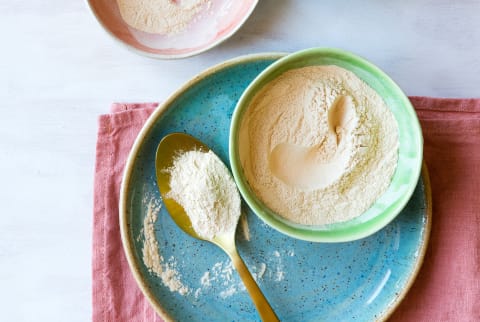Advertisement
There's No Such Thing As Vegan Collagen & This PhD & RD Explains Exactly Why


Have you ever heard of or played the card game Cheat? Let's play: I'm calling vegan collagen's bluff. Sorry, there's no such thing as vegan collagen.
"Is your collagen vegan?" is a common question we receive from the mbg family and collagen aficionados far and wide. The answer remains the same: Collagen protein/peptides/hydrolysate will never be vegan. Expecting a collagen supplement to be vegan is like expecting bone broth or a mink fur stole (yikes) to be vegan. They just aren't.
The animal kingdom provides collagen.
Collagen is the most prevalent protein in the animal kingdom1 (and absent in the plant kingdom). It's the structural protein foundation of those animals' connective tissues. That's why collagen products are derived from those tissues, for example:
- Cows: hide, tendon, bones
- Fish: skin, scales, bones
- Poultry: chicken cartilage, bones, eggshell membrane
- Pork: skin, bones, tendons
Collagen delivers functional peptides.
Collagen is a unique source of functional protein2 made up of 19 different amino acids. No, it's not technically a complete protein because it's missing tryptophan, one of the nine essential amino acids.
Nonetheless, science has shown that collagen peptides deliver meaningful nutritional value, contributing to daily protein needs, plus bioactive, functional benefits (e.g., skin, joint, and bone health).*
Why humans rely on collagen (hint: not just for lovely skin).
When I say collagen, you may immediately think of skin3. And that's very true. Collagen is probably most famous for its essential role in skin architecture, elasticity, resilience, and texture (and the gradual loss of those things as you age and lose collagen density).*
But don't silo this tough triple-helix protein to skin alone. Collagen is pivotal to the structure of connective tissues throughout our body, comprising one-third of total body protein4 in humans. In other words, collagen is whole-body relevant. That's because it's a ubiquitous, critical structural component for our gut, bones, teeth, vasculature (i.e., blood vessels), muscles, tendons, cartilage, organs, etc.
Can collagen be vegetarian?
Whether collagen can be categorized as "vegetarian" depends on how strict your vegetarian pattern and practices personally are. Because collagen peptide supplements deliver an array of amino acids, some vegetarians not only accept this targeted, pure protein source but embrace it as genuinely helpful. Other vegetarians equate collagen peptides with eating a steak. To each their own.
Anecdotally, I personally know many vegetarians, flexitarians (I am one), and pegans who incorporate collagen supplements into their daily diet, whether in their coffee (or iced coffee), plant-based milk, smoothie, or other creative recipes. Collagen is keto-friendly by design, but when looking for a collagen powder, make sure it has low or no sugar if you're keto-conscious.
Yes, there are vegan ingredients that support collagen health.
Dear vegans, if you see a collagen product that says it's "vegan," please know that it contains no/zero collagen. But don't despair, there are still vegan ingredients—key nutrients and bioactives—that absolutely support and nurture collagen synthesis and health.*
These collagen "boosters" may include ingredients like amino acids (especially proline, lysine, and glycine), vitamins C and E for collagen production and cross-linking, a B complex for cellular energy, or botanical antioxidants to protect collagen from oxidative damage.* If your vegan protein sources are delivering ample amino acid building blocks for collagen, then these helper compounds can support your body's endogenous collagen production and function.*
Not all collagen products are created equal.
A collagen supplement formula that features these aforementioned "helpers" is rare, but mindbodygreen delivers with beauty & gut collagen+. While the non-vegan 17.7 grams of premium types I and III collagen peptides from Brazilian grass-fed, pasture-raised cattle most definitely headline this product, the rest of the blend is equally intentional, with curated nutrients and bioactives included to:
- Support collagen synthesis (vitamins C and E).*
- Deliver antioxidant cellular protection to protect the collagen we have (curcuminoids from turmeric root extract, SGS from broccoli seed extract, and vitamins C & E).*
- Work in tandem to promote skin hydration (hyaluronic acid), gut integrity (L-glutamine), and hair-skin-nail essential functions (biotin).*
For the carnivores, here are some tips when shopping for a collagen supplement. Make sure the brand is transparent about these four things:
- The types of collagen peptides: types I, II, III, etc.
- The source of their collagen peptides: the animal species, the country or region, etc.
- How that animal was raised: grass-fed and pasture-raised for cows, sustainably sourced and wild-caught for fish, etc.
- The "Other ingredients" list: Check to see if the ingredients are few, plant-based, and preferably organic.
And if a brand is trying to sell you "vegan collagen," tap into the collagen in your connective tissues and run!
OK, technically bacteria can make vegan collagen (but it's GMO).
I don't want my vegan collagen case to be dismissed on a technicality. So yes, technically there is "vegan collagen"...if you want a genetically modified (GMO) product5. There are strains of bacteria and yeast that can be engineered to produce collagen with recombinant technology leveraging human genes, but again...GMOs. As an innovative biomaterial for lifesaving therapeutic applications, I say absolutely. But for regular collagen supplement consumption, I'm going with nope.
The takeaway.
Some things in life just aren't vegan, and collagen is one of them. That doesn't detract from the critical, widespread role of this structural protein in mammalian connective tissues. With a whole-body impact on human health, high-quality collagen peptides are a smart strategy for supporting collagen production and its ubiquitous functions in the body.*
